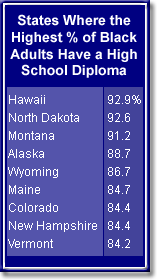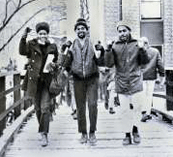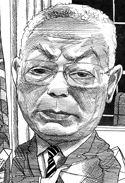The Best Graduate Programs in African-American History
 According to the latest ranking of graduate education programs by U.S. News & World Report, Yale University has the nation’s top program in African-American history. According to the latest ranking of graduate education programs by U.S. News & World Report, Yale University has the nation’s top program in African-American history.
Also, according to U.S. News, among the top 10 graduate programs in African-American history are Columbia, Berkeley, Rutgers, Chapel Hill, Duke, Harvard, New York University, Princeton, and the University of Michigan.
Northwestern University was rated as having the best program in African history.

New Monument to Rosa Parks Unveiled at Alabama State University
A new monument to Rosa Parks was unveiled recently on the campus of Alabama State University in Montgomery. The stone monument is located near Tullibody Hall on the Alabama State University campus. The property used to be the site of the Alabama State College Laboratory High School, from which Rosa Parks graduated. At the base of the monument are the words, “She sat down so we could stand up.”

Audit Finds Low Level of Racial Diversity at University of Missouri at Kansas City
 The University of Missouri at Kansas City often claims that it is the most diverse of the four University of Missouri campuses. But when the university conducted an audit of the racial climate on campus, the findings did not meet expectations. The audit, conducted by Shaun R. Harper of the Center for the Study of Higher Education at Pennsylvania State University, found that there were only three blacks among the 115 full professors at UMKC. All told, there are 20 blacks among the 408-member faculty. In making the report, Harper said that overall faculty diversity at UMKC “is the worst compared with any school I have visited in the country.” The University of Missouri at Kansas City often claims that it is the most diverse of the four University of Missouri campuses. But when the university conducted an audit of the racial climate on campus, the findings did not meet expectations. The audit, conducted by Shaun R. Harper of the Center for the Study of Higher Education at Pennsylvania State University, found that there were only three blacks among the 115 full professors at UMKC. All told, there are 20 blacks among the 408-member faculty. In making the report, Harper said that overall faculty diversity at UMKC “is the worst compared with any school I have visited in the country.”
Harper’s audit also found that black and Hispanic students felt isolated on campus and that they believed their professors had low expectations of their academic abilities.

  |
“He transformed the policy of affirmative action by reducing the pressure to hire more blacks and women.”
— Harvey C. Mansfield, Thomson Professor of Government at Harvard University, defending the record of outgoing Harvard president Lawrence Summers, in the Claremont Review of Books, Spring 2006
|
Bringing the High-Speed Internet to African Universities
Higher education in Africa is hindered to a large degree by a lack of Internet access. At many universities that are wired to the World Wide Web, slow connection speeds make the use of the Internet cumbersome. Many scholars agree that a high level of Internet access across the continent will be essential if African nations are ever able to work through the region’s problems.
One step in the right direction is the Bandwidth Initiative sponsored by six major American foundations. The five-year, $200 million program will connect terminals at 11 African universities to the Internet through satellite technology. Many of the universities will use the technology for distance learning projects, enabling a far greater number of students to enroll in higher education classes.

Black Students at UCLA Protest Low Level of Minority Admissions
 Among graduates of California high schools, only 2 percent of all students admitted to the University of California at Los Angeles for this fall’s entering class are black. UCLA was one of three campuses of the University of California where admissions of underrepresented minorities declined from a year ago. Among graduates of California high schools, only 2 percent of all students admitted to the University of California at Los Angeles for this fall’s entering class are black. UCLA was one of three campuses of the University of California where admissions of underrepresented minorities declined from a year ago.
In response to the admissions statistics, black students at UCLA held a protest on campus. The protesters wore black, mourning for their African-American peers who were rejected for admission. Many wore paper bags over their heads to symbolize the lack of diversity on the UCLA campus.
UCLA is barred by state law from considering race in its admissions decisions.

Virginia Union University Looks to Bring Music to a Belfry That Has Been Quiet for 65 Years
 The Belgian Friendship Pavilion was one of the more striking architectural structures at the 1939-40 New York World’s Fair. By the end of the fair, Belgium was occupied by the Nazis. So the Belgium government in exile donated the building to Virginia Union University, the historically black educational institution in Richmond. The Belgian Friendship Pavilion was one of the more striking architectural structures at the 1939-40 New York World’s Fair. By the end of the fair, Belgium was occupied by the Nazis. So the Belgium government in exile donated the building to Virginia Union University, the historically black educational institution in Richmond.
The building was disassembled, transported to Richmond, and reconstructed on the Virginia Union campus. But the 35-bell carillon that sat atop the Friendship Pavilion was not included in the donation. Those bells were donated to Stanford University and remain atop the Hoover Tower in Palo Alto.
Now an effort is under way at Virginia Union to raise $800,000 to buy replacement bells for the Belgium Friendship Pavilion building on the Virginia Union campus. A nonprofit organization called Bells for Peace has been founded by a Virginia Union alumna, who has scheduled a series of concerts this spring to begin raising the necessary funds.

University of North Texas

Visiting Faculty Position, Information Systems
Rank and Salary: This is a visiting, non-tenure track position beginning fall 2006 and continuing through spring 2007. Salary is competitive and commensurate with experience. Applicants at all ranks are encouraged to apply.
Responsibilities: Candidates should have teaching skills in both introductory and more advanced information systems major courses. More consideration will be given to people with systems analysis/design and database teaching experience; particularly those with Oracle experience. Candidates are expected to teach a maximum course load of 4-4, with a minimum of 3-3 for the 2006-2007 academic year. Course loads are determined by coverage needs and service activities.
Requirements: Candidates must either have a Ph.D. in information systems or related field or be A.B.D. Preference is for a completed Ph.D.
Application Procedure: Submit letter of application, names and contact information for three references, complete curriculum vitae, and official transcripts to:
Dr. Mary C. Jones
Interim Chair, Information
Technology & Decision Sciences Department
College of Business Administration
P.O. Box 305249
Denton, TX 76203
Phone: 940.565.3117; Fax: 940.565.4935; Email: jonesm@unt.edu
Application Deadline: Review of applicants will begin immediately and continue until the position is filled.
The University of North Texas is an Equal Opportunity/Affirmative Action institution committed to diversity in its educational programs, thereby creating a welcoming environment for everyone. The University of North Texas encourages applications from women and underrepresented groups.
New Evidence That There Was a Black Student at the University of Arkansas During the Reconstruction Era
In 1948 Silas Hunt, a black man, entered the law school at the University of Arkansas. He died the next year from tuberculosis without earning a degree. In 1955 three black women enrolled in the undergraduate nursing program at the University of Arkansas. They went on to become the first black students to earn bachelor’s degrees at the university.
 But new research has found that at least one black student was enrolled at the university during the Reconstruction era. Gordon Morgan, who in 1969 became the first full-time black faculty member at the University of Arkansas, came across a clipping from the Little Rock Daily Republican dated February 8, 1873, which mentioned a black man in the initial entering class of the university. The article read: “The name of the student is McGahee, and he is preparing himself for the ministry of the Episcopal church. We are glad to learn the fact. Better one than none.” But new research has found that at least one black student was enrolled at the university during the Reconstruction era. Gordon Morgan, who in 1969 became the first full-time black faculty member at the University of Arkansas, came across a clipping from the Little Rock Daily Republican dated February 8, 1873, which mentioned a black man in the initial entering class of the university. The article read: “The name of the student is McGahee, and he is preparing himself for the ministry of the Episcopal church. We are glad to learn the fact. Better one than none.”
Checking the registration list, Professor Morgan found that a James McGahee was listed as a student during the 1872-73 and 1873-74 academic years. There is no further record of this student.

Xavier University Has a Friend in the Persian Gulf
 The Persian Gulf nation of Qatar is donating $60 million to help the people of New Orleans who continue to suffer from the impact of last August’s Hurricane Katrina. Almost a third of the total grant will go to Xavier University, the historically black educational institution in New Orleans, which is affiliated with the Roman Catholic Church. The Persian Gulf nation of Qatar is donating $60 million to help the people of New Orleans who continue to suffer from the impact of last August’s Hurricane Katrina. Almost a third of the total grant will go to Xavier University, the historically black educational institution in New Orleans, which is affiliated with the Roman Catholic Church.
Qatar will donate $12.5 million to Xavier for the university school of pharmacy to add 60,000 square feet of space to its facilities. In addition, there will be a $5 million grant for Xavier to use for scholarships for students who were affected by the hurricane.

Black Candidate for Congress in North Carolina Is a Determined Opponent of Affirmative Action in Higher Education
 Last week Vernon Robinson, who calls himself “the black Jesse Helms,” won a landslide victory in the GOP primary in North Carolina’s Thirteenth Congressional District. Robinson will face off against incumbent Democrat Brad Miller in November. Last week Vernon Robinson, who calls himself “the black Jesse Helms,” won a landslide victory in the GOP primary in North Carolina’s Thirteenth Congressional District. Robinson will face off against incumbent Democrat Brad Miller in November.
Robinson, a graduate of the United States Air Force Academy and former commander of a Minuteman Missile launch facility, taught for 10 years at the business school at the historically black Winston-Salem State University.
On his Web site (http://www.VernonRobinson.com), the candidate offers the following assessment of race-sensitive admissions in higher education: “Race based admissions worsen rather than improve race relations. First, these programs help white women and upper middle class blacks, not the brothers on the block as was intended. By using race based policies, racial resentment increases rather than decreases. These policies undermine meritorious achievements of minorities and undermine self-confidence. Creating a racial spoils system permanently abandons the ‘content or our character’ moral high ground of the civil rights struggle.”

Appointments
 • Lloyd V. Hackley was named interim deputy chancellor of North Carolina A&T State University in Greensboro. Dr. Hackley, who is chancellor emeritus of Fayetteville State University, will head the university until a permanent replacement can be found for outgoing chancellor James C. Renick. Dr. Renick is taking an executive position at the American Council on Education. • Lloyd V. Hackley was named interim deputy chancellor of North Carolina A&T State University in Greensboro. Dr. Hackley, who is chancellor emeritus of Fayetteville State University, will head the university until a permanent replacement can be found for outgoing chancellor James C. Renick. Dr. Renick is taking an executive position at the American Council on Education.
• Vanessa Williams Smith is the new assistant director for retention and outreach programs at the Office of Institution Diversity at the University of Georgia. She was the director of multicultural services at the university.
 • Daniel K. Wims was appointed executive vice president for academic affairs at Fort Valley State University in Georgia. He was an associate professor and assistant vice president for student affairs at South Carolina State University. • Daniel K. Wims was appointed executive vice president for academic affairs at Fort Valley State University in Georgia. He was an associate professor and assistant vice president for student affairs at South Carolina State University.
Wims is a 1987 graduate of Fort Valley State University. He has a master’s degree in agricultural education from Ohio State University and a doctorate from the University of Maryland.

Resignation
 • Gilbert Holmes, dean of the University of Baltimore School of Law, announced that he will step down from the position at the end of the 2006-07 academic year. Dean Holmes, who in 2001 became the first African American to head the law school, will take a one-year sabbatical and then return to the law school to teach. • Gilbert Holmes, dean of the University of Baltimore School of Law, announced that he will step down from the position at the end of the 2006-07 academic year. Dean Holmes, who in 2001 became the first African American to head the law school, will take a one-year sabbatical and then return to the law school to teach.
Dean Holmes is a graduate of Bucknell University and earned his law degree at New York University.

Grant
• Hampton University, the historically black educational institution in Virginia, received a two-year, $10,000 grant from the American Cancer Society. The grant will be used to fund cancer awareness campaigns on the Hampton campus and also to provide seed money for fundraising events.

|
Black High School Completion Rates Vary to a Great Degree in the 50 States
In order to go on to college, obviously a high school diploma is a necessity. Nationwide only 72.3 percent of all black adults hold a high school diploma. Therefore, a large segment of the adult black population lacks the necessary qualification for even considering higher education as a route to greater mobility and economic success.
 A new Census Bureau report reveals for the first time the educational level of black adults in each region and each state at the time of the 2000 census. As expected, the southern states have the lowest percentages of blacks who hold a high school diploma. A new Census Bureau report reveals for the first time the educational level of black adults in each region and each state at the time of the 2000 census. As expected, the southern states have the lowest percentages of blacks who hold a high school diploma.
An exception is the state of Georgia, where the percentage of blacks with a high school diploma is slightly higher than the national average.
The census statistics show that more than 90 percent of all blacks in Hawaii, North Dakota, and Montana in 2000 held a high school diploma. Alaska, Wyoming, Maine, Colorado, and New Hampshire also have a high percentage of blacks who have completed high school.
Among northern states, blacks in Wisconsin were the least likely to have a high school diploma. Low rates of high school completion for blacks also occur in New York and Rhode Island.

College Enrollment Rates for Black Graduates of Chicago’s Public High Schools
A report by the Consortium on Chicago School Research at the University of Chicago finds significant racial disparities in college enrollment rates for graduates of the city’s public schools. The report, entitled From High School to the Future, shows that 52 percent of the black graduates of the city’s high schools go on to college. This is below the national average of 57 percent for black high school graduates. For whites, 63 percent of the graduates of Chicago’s public high schools go on to college. This is slightly below the national average for white students.
The report also discovers a wide gender gap among black high school graduates. While 64 percent of black females went on to college, only 45 percent of black male graduates of the city’s high schools enrolled in college.


Harvard Alumni Establish Fund to Aid African Graduate Students
Alumni of the Harvard Class of 1981 have established a scholarship fund to benefit higher education in Africa. The Harvard Alumni Fund for Social Action will provide scholarship funds for students from Africa to do graduate work at Harvard University. The group will also set up a cooperative arrangement with a sister university in sub-Saharan Africa and will provide funds to aid students studying in Africa.
 The fund was established by Harvard alumna Paula A. Tavrow, director of the Bixby Program in Population and Reproductive Health at the School of Public Health at the University of Southern California at Los Angeles. Dr. Tavrow has raised nearly $300,000 from members of the Harvard Class of 1981 and hopes to raise several million dollars before the class holds its 25th reunion this June. She has worked out an arrangement with Harvard where alumni can send their annual gifts to the university directly to the Fund for Social Action. She hopes to expand the fundraising effort to other classes of Harvard alumni in the future. The fund was established by Harvard alumna Paula A. Tavrow, director of the Bixby Program in Population and Reproductive Health at the School of Public Health at the University of Southern California at Los Angeles. Dr. Tavrow has raised nearly $300,000 from members of the Harvard Class of 1981 and hopes to raise several million dollars before the class holds its 25th reunion this June. She has worked out an arrangement with Harvard where alumni can send their annual gifts to the university directly to the Fund for Social Action. She hopes to expand the fundraising effort to other classes of Harvard alumni in the future.

  |
48% Percentage of all white American individuals who are women.
58% Percentage of all affluent African-American individuals who are women.
source: Phoenix Cultural Access Group
|
Three Black Scholars Named Fellows of the National Humanities Center
The National Humanities Center in Research Triangle Park, North Carolina, recently selected 39 fellows for the 2006-07 academic year. These fellows, selected from over 500 applicants, will come to North Carolina to work on individual projects in the humanities and participate in seminars, lectures, and conferences.
Three of the 39 new fellows are black. They are listed below along with the projects they will be working on during their year at the National Humanities Center:
 • J. Kameron Carter is an assistant professor of theology and black church studies at Duke University Divinity School. He is writing a book entitled Du Bois, Religion, and the Black Intellectual Imagination, 1888-1935. • J. Kameron Carter is an assistant professor of theology and black church studies at Duke University Divinity School. He is writing a book entitled Du Bois, Religion, and the Black Intellectual Imagination, 1888-1935.
 • Maryemma Graham is a professor of English and founder of the Project on the History of Black Writing at the University of Kansas. She is currently working on her third book about author Margaret Walker. • Maryemma Graham is a professor of English and founder of the Project on the History of Black Writing at the University of Kansas. She is currently working on her third book about author Margaret Walker.
 • Randal M. Jelks is a professor of history at Calvin College in Grand Rapids, Michigan. He is currently working on a new book entitled Benjamin Elijah Mays, a Religious Rebel in the Jim Crow South: An Intellectual Biography. • Randal M. Jelks is a professor of history at Calvin College in Grand Rapids, Michigan. He is currently working on a new book entitled Benjamin Elijah Mays, a Religious Rebel in the Jim Crow South: An Intellectual Biography.

University of Minnesota Honors Black Students Who Took Over the Administration’s Headquarters in 1969
On January 14, 1969 a large group of black students took over the administration building at the University of Minnesota. They demanded that the university establish a black studies program and provide increased financial aid to black students on campus. Within 24 hours the black students’ demands were met. Some students were arrested for taking over the building but all were acquitted of the major charges.

Black student protesters at the University of Minnesota in 1969 emerging from the administration building after their demands had been met.
Late last month the university celebrated the takeover by inviting the student protesters back to campus. Sue Hancock, of the Office for Multicultural and Academic Affairs, welcomed the former students back to campus saying, “We are thankful to you. You put your lives on the line so that the University of Minnesota and the people who followed you would have a different experience.”

Former President of Morris Brown College Admits to Fraud in Student Loan Embezzlement Case
 With the embezzlement trial of former Morris Brown College president Delores Cross set to begin in Atlanta, the man who had served as director of financial aid at Morris Brown College, Parvesh Singh, pleaded guilty to one count of theft of federal funds. Singh admitted to fraudulently securing $92,000 in government loans for students who were not enrolled in the college. As part of his plea bargain, Singh agreed to testify against Delores Cross. With the embezzlement trial of former Morris Brown College president Delores Cross set to begin in Atlanta, the man who had served as director of financial aid at Morris Brown College, Parvesh Singh, pleaded guilty to one count of theft of federal funds. Singh admitted to fraudulently securing $92,000 in government loans for students who were not enrolled in the college. As part of his plea bargain, Singh agreed to testify against Delores Cross.
Then, Cross, knowing that Singh’s testimony would be damaging to her defense, also pleaded guilty to one count of embezzlement. As part of the deal she made with prosecutors, Cross, now 69 years old, will be required to pay $11,000 in restitution. She could face up to 16 months in jail. Had she been convicted at trial, Cross faced a jail term of five years and a fine of $250,000. In addition, she faced 24 other counts, all of which were dropped in the plea deal.

With an Eye on the White House, Senator George Allen Reaches Out to Black Voters by Proposing Increased Funding for HBCUs
 Senator George Allen of Virginia is up for reelection this year. He is a heavy favorite. But Senator Allen is also rumored to be contemplating a run for the presidency in 2008. Allen knows that if he can attract only a small percentage of black voters he will increase his chances of winning reelection and maybe the White House. Senator George Allen of Virginia is up for reelection this year. He is a heavy favorite. But Senator Allen is also rumored to be contemplating a run for the presidency in 2008. Allen knows that if he can attract only a small percentage of black voters he will increase his chances of winning reelection and maybe the White House.
But Allen has a lot of work to do. In his photograph for his high school yearbook, Allen is seen wearing a Confederate flag pin on his lapel. Before becoming governor of Virginia, Allen displayed a Confederate flag in a cabin near his home. And he once displayed a noose in his office. Allen claimed that the noose was in honor of the Old West, not the Jim Crow South.
In an appeal to black voters in Virginia and the nation as a whole, Allen is now proposing a congressional resolution that would offer an apology to African Americans for the institution of slavery in this country. Allen is on record as opposing reparations for slavery but he believes one way to make amends is to increase funding for the nation’s historically black colleges and universities. Allen proposes that the nation invest in upgrades of the technology infrastructure at HBCUs.

Duke University

Dean, The Fuqua School of Business
Duke University invites applications and nominations for the position of Dean of The Fuqua School of Business. The School is a major center for research and management education with a daytime MBA program, four Executive MBA programs (Cross-Continent, Frankfurt-Goethe, Global and Weekend), a Ph.D. program and open-enrollment Executive Education programs.
The Dean of The Fuqua School of Business is its chief academic and administrative officer and is responsible to the Provost and the President for leadership of the School. The Dean must have a commitment to further the educational and research goals of an elite professional school within a major research university. The Dean must be a visionary leader able to develop, articulate and execute strategies to accomplish the School’s goal of leadership in management education and research worldwide. He or she should be able to develop a relationship of mutual respect with all of the School’s partners, including faculty, students, staff, alumni, university leaders, corporate supporters and donors. The start date is July 1, 2007.
All applications will be held in strict confidence by the Search Committee. Applications and nominations should be sent to: Professor Christine Moorman, Chair, Dean Search Committee, The Fuqua School of Business, Duke University, 1 Towerview Road, Durham, North Carolina 27708, USA. Fax: 919-660-7951. Email: fuquadeansearch@duke.edu. The committee will begin reviewing nominations and applications after July 15, 2006.
Duke University is an equal opportunity/affirmative action employer.
Colin Powell Donates $1 Million to City College of New York
 Former Chair of the Joint Chiefs of Staff and former U.S. Secretary of State Colin Powell made a $1 million donation to the City College of New York to fund the Colin Powell Center for Policy Studies. Powell is a 1958 graduate of City College. Earlier, Powell had made a $350,000 donation to the college to establish a scholarship program in honor of his parents. Former Chair of the Joint Chiefs of Staff and former U.S. Secretary of State Colin Powell made a $1 million donation to the City College of New York to fund the Colin Powell Center for Policy Studies. Powell is a 1958 graduate of City College. Earlier, Powell had made a $350,000 donation to the college to establish a scholarship program in honor of his parents.
In addition to the gift, General Powell also announced the names of the 20-member advisory committee for the Powell Center. Included on the board are James Baker III, Tom Brokaw, Vernon Jordan, Barbara Walters, Vartan Gregorian, and Henry Kissinger.

Protests at Boston College Over an Honorary Degree for Condoleezza Rice
 Two professors at Boston College have protested the decision of the institution to award an honorary degree to Condoleezza Rice at commencement ceremonies on May 22. David Hollenbach, a professor of theology, and Kenneth R. Himes, an associate professor of theology, wrote a letter to the administration saying that on moral principle the Jesuit institution should not be honoring a woman whose policies are “inconsistent with the humanistic values that inspire the university’s work.” Two professors at Boston College have protested the decision of the institution to award an honorary degree to Condoleezza Rice at commencement ceremonies on May 22. David Hollenbach, a professor of theology, and Kenneth R. Himes, an associate professor of theology, wrote a letter to the administration saying that on moral principle the Jesuit institution should not be honoring a woman whose policies are “inconsistent with the humanistic values that inspire the university’s work.”
At least 150 faculty members at the university have voiced support for the two professors’ protest.

|



